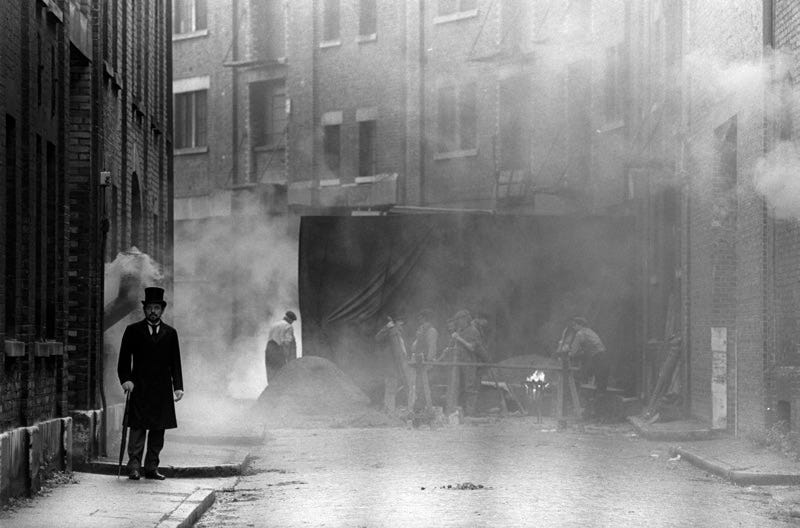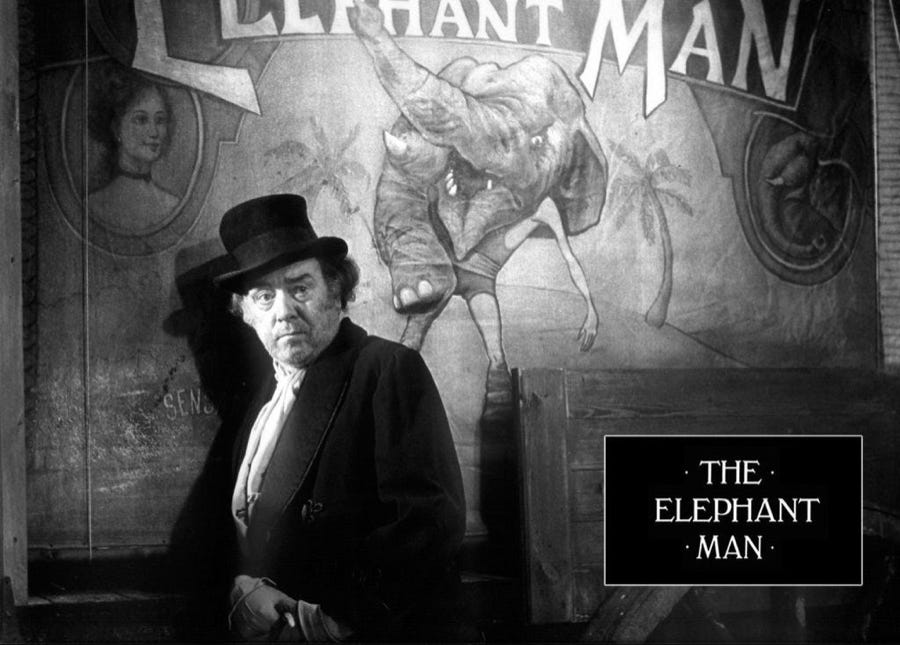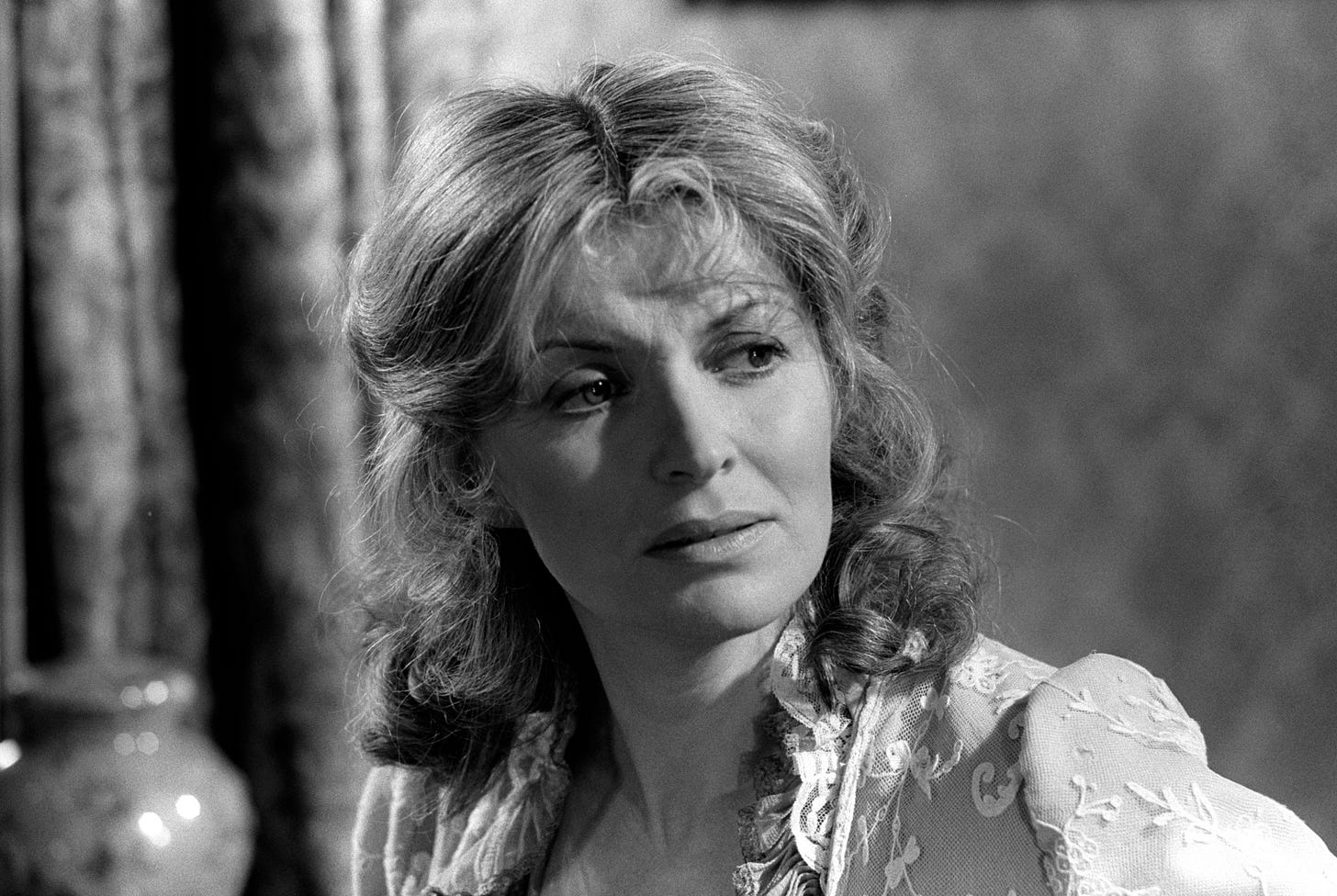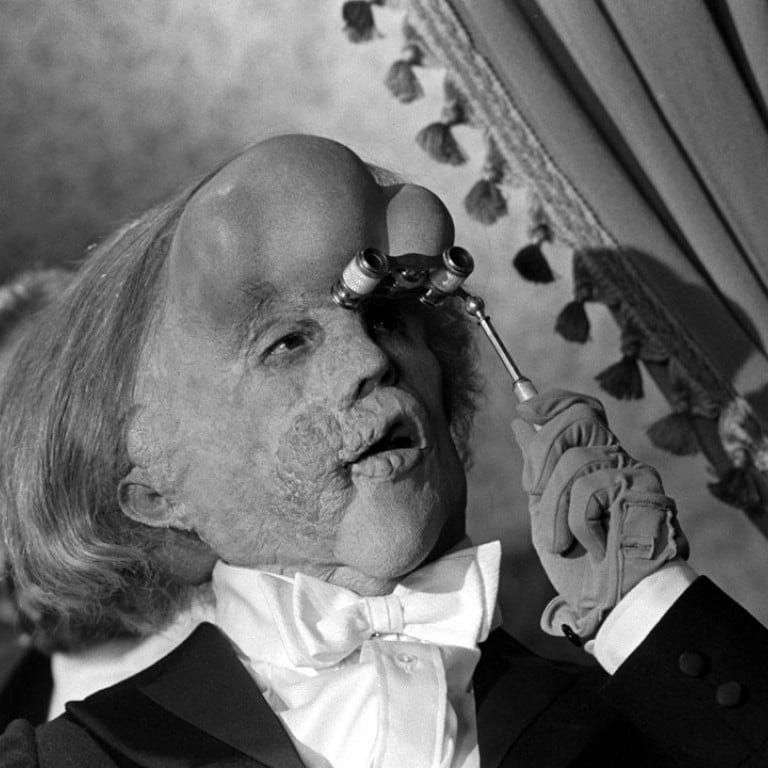The Elephant Man (1980)
I am not an animal... I am a human being!
If there’s a perfect evocation of Victorian London on celluloid, this has to be it. David Lynch’s film is a seminal masterpiece: in my opinion, one of the best films of the 1980s. Even if you’ve never seen The Elephant Man (1980), I expect you will have heard of the Elephant Man- the unfortunate John Merrick. John was born in Leicester, with severe deformities, now thought to be the rare congenital disorder, Proteus syndrome; by the late 1880s finding himself in the employ of showman, Tom Norman- the lead act of a ‘Penny Gaff’ in the Whitechapel Road- situated almost directly opposite the London Hospital. As that fountain of truth, Wikipedia, confirms: “a Penny Gaff was a form of popular entertainment for the lower classes in 19th century England”. A penny permitted entrance to a small back stage and curtain, with music provided by a piano or barrel organ. And that’s where distinguished surgeon, Frederick Treves (played by Anthony Hopkins), discovers poor John Merrick. Incidentally, the building’s still there. At 123 Whitechapel Road (now 259, The Ukay International Saree Centre).
For the photography, David Lynch turned to Freddie Francis- an inspired choice: perhaps better known as a director of horror films: The Skull (1965), Amicus’ superior flick based on the short story by Robert Bloch- starring Peter Cushing as an antiques connoisseur on the trail of the skull of the Marquis de Sade; and as cinematographer: The Innocents (1961), with Deborah Kerr, based on Henry James’ The Turn of the Screw- and, in 1981, the year following The Elephant Man, director of film on The French Lieutenant’s Woman.
Freddie Francis’ cinematography (reminding me, at times, of the work of London street photographers, John Thomson or Paul Martin) captures the essence of late 19th century London in glorious monochrome; Gothic, gaslit London in all its black and white glory: steam belching from working, clunking, mechanical engines (a chiaroscuro effect), circus graphics, the crank of a fairground barrel organ, stark antiseptic hospital wards, the shrill whistle of a departing train, ceramic metro tiles in a dingy Victorian railway station urinal. It’s all there.
And John Morris’ eerie soundtrack is, again, inspired: like a barrel organ or a fairground carousel, or the tinkle of a nursery music box; Never-Never Land. It’s a rare thing when everything gels; in film: when direction, photography, editing, acting, music and design come together as one- and in this respect, The Elephant Man is hard to fault. Anthony Hopkins, as ever, gives a marvellous, sensitive performance as Treves- bringing to mind his equally sensitive performance as the repressed butler in The Remains of the Day (1993), and the mild-mannered bookseller in 84 Charing Cross Road (1987). As does Hannah Gordon- a possibly underrated actress (although I hesitate to use that often overused description), as Treve’s sympathetic wife, with Gordon’s interactions with Merrick at the oh-so-polite tea party, frankly, reducing me- and others I have discussed this with- to tears.
John Hurt is, of course, fabulous too- as the Elephant Man, playing him with immense dignity, compassion and understanding- an especially distinguished performance considering the burden of Christopher Tucker’s make-up and prosthetics. At this point, we also need to mention the non-associated Broadway production by Bernard Pomerance, which ran between 1979 and 1981 and won the New York Drama Critic’s Circle Award, starring David Bowie (amongst others) as Merrick - a role which, apparently, left Bowie distraught, especially following the assassination of his friend, John Lennon, by Mark Chapman outside the Dakota Building on a cold December night in 1980.
The Academy of Motion Picture, Arts and Sciences nominated The Elephant Man for no less than eight Academy Awards, but with the notable omission of an award for the make-up, rectified by the Academy the following year. Yet, despite The Elephant Man’s critical success, the distinguished film critic, Roger Ebert, only gave the film two out of five stars, writing: "I kept asking myself what the film was really trying to say about the human condition as reflected by John Merrick, and I kept drawing blanks." Which just goes to show- cinema is very much about opinion isn’t it?
Mention the horror which is Star Wars (1977) and my eyes are glazing over…
The Elephant Man (1980) is available to watch via DVD and Blu-Ray and there’s a tasty special 40th Anniversary Edition on Blu-Ray in 4K Ultra High Definition. It’s also available to Amazon Prime Video members on instant digital download- at a bargain ‘buy it now’ £3.99.
Right. Where we now on Luke Honey’s WEEKEND FLICKS. Cinema for Grown Ups? It all began at the beginning of December, 2023, and after three months, we’re at 237 subscribers. So thank you. Although this is a post for free-subscribers, paid-for subscribers get two film recommendations every weekend, plus access to the entire archive. By the end of the year, there should be over 100 films.








One of my favourites because of the incredibly atmospheric backdrop.. almost eerie in places... which lends to the poignancy of the film .. which of course was beautifully heartbreaking and honestly..it haunted me for a long time...just as a film like this intends I believe and it delivered. Exceptional choice Luke!
An incredibly atmospheric film, almost timeless in its style, that captures Victorian locations many of which have now vanished as London powers ever onwards. Poor Merrick's skeleton remains in the collection of the Royal London Hospital's museum, yards from where I'm writing this.